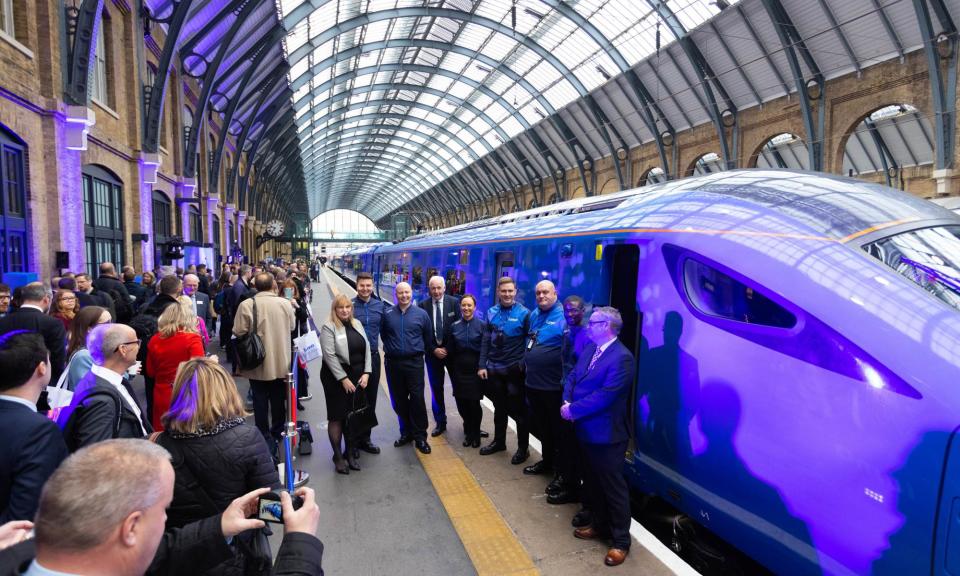Rail firm FirstGroup plans to expand cut-price Lumo services

The British transport operator FirstGroup has applied for two more “open access” services outside the main train operating contracts as the government attempts to increase competition on the rail network and cut fares.
Open access means the operator takes full commercial risk, running services on infrastructure owned by a third party, on a chosen route that is not subject to a rail franchise set by the Department for Transport.
FirstGroup began running an open access service through its Lumo business between London and Edinburgh in October 2021, which has carried more than 2.5 million passengers so far. It says train cancellations are among the lowest in the industry.
Related: Very little achieved on rail reforms in Great Britain in past six years, say MPs
Encouraged by the success of Lumo, FirstGroup said it had recently submitted applications to the Office of Rail and Road for a new Hull Trains service between London and Sheffield, which could start in 2026, and a new Lumo service between Rochdale and London, which could begin in 2027.
It has also applied for the extension of a number of Lumo’s daily services to and from Glasgow; for an additional, eighth return service on Hull Trains between London and Hull and for an extra sixth return Lumo service between London and Newcastle. If successful, these services will more than double its open access capacity over the next three to five years.
Graham Sutherland, the FirstGroup chief executive, said the new services, designed to bring cheaper fares to under-served UK destinations, would “bring people on to rail that might have gone for other transport options” such as by car or air. Open access routes account for just 0.3% of all rail network traffic in the UK.
Lumo fares start from £19.90 if booked 12 weeks in advance and average £40 for a single ticket from London to Edinburgh, Sutherland said. This compares with single fares of about £50 on LNER for advance bookings.
Other players include Richard Branson’s Virgin Group, which wants to make a comeback on the west coast mainline it used to run on an open access basis.
FirstGroup, one of the UK’s biggest rail operators with more than 770,000 passenger journeys daily last year, said its open access operations had continued to perform better than expected in the year to 30 March. It has “consistently recorded some of the lowest levels of operator-related cancellations in the industry”, the company said.
Lumo increased revenues by 42% year on year, with 75% of seats full, up from 71% the year before.
At Hull Trains, revenues rose 40% last year thanks to increased leisure demand and significantly higher numbers of business passengers. In response, the company has added 14% more capacity since December 2022, running trains with 10 carriages rather than five at peak times. Seats were 69% full, up from 59% the year before.
FirstGroup reported an overall adjusted pre-tax profit of £136.8m for last year, up from £97.9m the previous year. It is monitoring the European rail network for open access opportunities.
“What you’re seeing in Europe is not dissimilar to UK open access,” said Sutherland. “The areas that move fastest are Italy, Spain and France. But our priority is the UK.”
Sharon Graham, the Unite general secretary, said this strengthened the case for public ownership. She added: “FirstGroup is extracting colossal profits from our bus and rail networks at the expense of passengers and workers. It makes no sense to pour billions of pounds into subsidising public transport and then allow third-party operators to profiteer from them by running down jobs and services.”
Sutherland said the bulk of the profits were reinvested in infrastructure and assets, and highlighted the company’s average increase in wages across bus and rail of 8% over the past 12 months.
The government has encouraged applications for more open access rail services to increase competition with the leading line operators. However, rail industry leaders see them as inefficient, while the RMT union has described the new model as “parasitic”.
Labour’s plan for a “pragmatic” renationalisation of the railways matches the Conservatives’ policy on open access train providers.
Labour’s policy document said open access “will remain where it adds value and capacity to the rail network”.
A number of routes are in the pipeline, including a direct London-Wrexham rail service unveiled in March, as well as trains running from the capital straight to Stirling in Scotland, a service planned by the open access operator Grand Union, which was set up by the former British Rail executive Ian Yeowart.

 Yahoo Finance
Yahoo Finance 